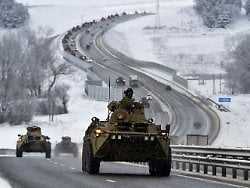Crisis meeting on Russia
US and EU call for “steps of de-escalation”
1/25/2022 5:53 am
In view of the tense situation in the Ukraine conflict, one crisis meeting follows the next. The United States and several European countries are warning Russia of the serious consequences of an attack on Ukraine. Meanwhile, the possible departure of diplomatic families is causing further upsets between Berlin and Kiev.
In the Ukraine conflict, the heads of state and government of Europe and the USA have emphasized their unity. After a video conference on Monday evening, US President Joe Biden said he had “completely agreed” with his European allies. Chancellor Olaf Scholz stated that the participants “shared the view that it is up to Russia to take visible steps towards de-escalation”. NATO had previously announced that it would increase its military presence in Eastern Europe.
According to a statement from the White House, the heads of state and government “emphasized their common desire for a diplomatic solution”. French President Emmanuel Macron wants to propose “a way of de-escalation” to his Russian counterpart Vladimir Putin in a talk “in the next few days”. However, the spokesman for the federal government, Steffen Hebestreit, also confirmed that “further Russian aggression against Ukraine will have very serious consequences”.
The heads of state and government of Great Britain, Italy and Poland as well as the heads of NATO and the EU also took part in the almost one and a half hour discussion. EU Commission President Ursula von der Leyen said after the meeting that the EU is still working on a “wide range” of sanctions against Russia. According to von der Leyen, the EU Commission is also planning to increase financial support for Ukraine by 1.2 billion euros.
USA preparing NATO reinforcements
The US had previously said it had put up to 8,500 military personnel on alert. That means they could be ready within five days to reinforce NATO’s 40,000-strong Rapid Reaction Force. However, a Pentagon spokesman emphasized that “no decision has yet been made about moving the armed forces” outside of the United States.
For its part, NATO announced that it would put forces on standby and send ships and warplanes to strengthen its defenses in Eastern Europe. NATO Secretary General Jens Stoltenberg wrote on Twitter that a “new aggression” against Ukraine would incur “heavy costs”. In the past few days, France, Spain, Denmark and the Netherlands had announced an increase in their military presence in the east.
Criticism came immediately from Kremlin spokesman Dmitri Peskov: “The tensions are being exacerbated by the announcements and concrete measures by the USA and NATO.” Russia has massed more than 100,000 troops on the Ukrainian border in recent weeks. The West fears a Russian attack on the neighboring country. Moscow, on the other hand, has denied any invasion plans.
Families of German diplomats can leave the country
The US had previously ordered the families of US diplomats in Kiev to leave Ukraine because of tensions with Russia. Great Britain and Australia also announced that they would withdraw some of their embassy staff from Ukraine. France did not withdraw its diplomats, but advised against unnecessary trips to Ukraine. Germany finances the voluntary departure of relatives of embassy employees.
Kiev and EU foreign policy chief Josep Borrell described the step as premature. “You have to stay calm and do what is necessary, but avoid a nervous breakdown,” Borrell said after a video conference between European foreign ministers and US department head Antony Blinken. In the newspapers of the Funke media group, the Ukrainian ambassador to Germany, Andriy Melnyk, once again criticized Germany’s “unjust and incomprehensible refusal” to arms deliveries. He described the Federal Foreign Office’s decision to allow diplomatic families to leave voluntarily as “premature” and emphasized: “It is important to keep a cool head, even in the face of this enormous threat from Russia.”
Tensions had arisen between Kiev and Berlin in the past few days because of the German government’s refusal to supply arms to Ukraine and controversial statements by Navy chief Kay-Achim Schönbach, who has since resigned.
Representatives of Russia and Ukraine want to meet in Paris on Wednesday for talks. A meeting at the advisory level in the so-called Normandy format should take place together with France and Germany, according to Élysée circles. In terms of content, it should be about negotiating humanitarian measures and setting a date on which Ukraine and separatists will discuss a law on the status of Donbass. It should also be about Ukraine’s considerations for the time after the intended reintegration of the breakaway areas in eastern Ukraine. France and Germany are mediating in the Normandy format conflict between Ukraine and Russia that has been going on since 2014. However, the peace plan agreed in Minsk in 2015 is on hold.
